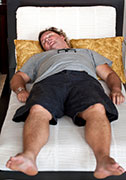- The Best Time of Day to Drink Bone Broth to Maximize Health Benefits
- 8 Ways to Increase Dopamine Naturally
- 7 Best Breads for Maintaining Stable Blood Sugar
- Gelatin vs. Collagen: Which is Best for Skin, Nails, and Joints?
- The Long-Term Effects of Daily Turmeric Supplements on Liver Health
- Could Your Grocery Store Meat Be Causing Recurring UTIs?
- Are You Making This Expensive Thermostat Error This Winter?
- Recognizing the Signs of Hypothyroidism
- 10 Strategies to Overcome Insomnia
- Could Artificial Sweeteners Be Aging the Brain Faster?
Sleep Apnea Might Raise Pneumonia Risk: Study


People with sleep apnea may be at greater risk for developing pneumonia, according to a new study. And the more severe the sleep apnea, the greater the risk, the research suggests.
“This study showed that sleep apnea is an independent risk factor for incident pneumonia,” wrote Dr. Vincent Yi-Fong Su and Dr. Kun-Ta Chou of the department of chest medicine at Taipei Veterans General Hospital in Taiwan. “Our results also demonstrated an exposure-response relation in that patients with more severe sleep apnea may have a higher risk of pneumonia than patients with sleep apnea of milder severity.”
The sleep disorder causes the upper airway to become blocked, cutting off oxygen during sleep. The researchers said this increases the risk for aspiration, or inhaling contents or fluid from the throat into the lungs. This can put people at greater risk for pneumonia.
The 11-year study, published March 3 in CMAJ, involved 34,100 patients. Close to 7,000 of these participants had sleep apnea, and about 27,000 did not.
The researchers found that more than 9 percent of the sleep apnea group developed pneumonia, compared to less than 8 percent of those without the sleep disorder. The risk was higher among patients using continuous positive airway pressure (CPAP) therapy, considered the gold standard for treating sleep apnea.
However, those who developed pneumonia were older and had other health problems, such as heart disease, diabetes and dementia.
While the study showed an association between sleep apnea and pneumonia risk, it did not prove a cause-and-effect link.
More information
The U.S. National Heart, Lung, and Blood Institute provides more information on sleep apnea.
Source: HealthDay
Copyright © 2026 HealthDay. All rights reserved.










